Sleeping with Pets
In this article we'll cover the trends and facts about sleeping with your pet, the benefits and risks, and tips for establishing bedroom boundaries with your furry family members.
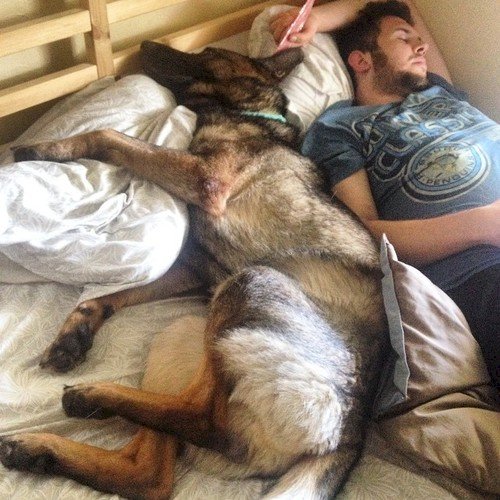
SLEEPING WITH PETS
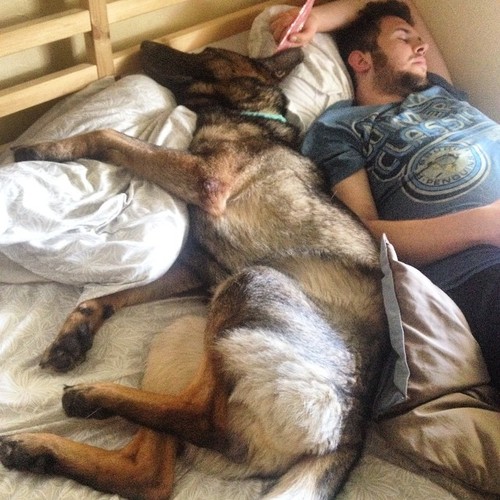
Many of us allow our pets to sleep with us, but is it healthy? Are there health risks to letting your dog or cat share the bed with you? How does it affect your relationship with your pet?
Below we’ll cover the trends and facts about sleeping with your pet, the benefits and risks, and tips for establishing bedroom boundaries with your furry family members.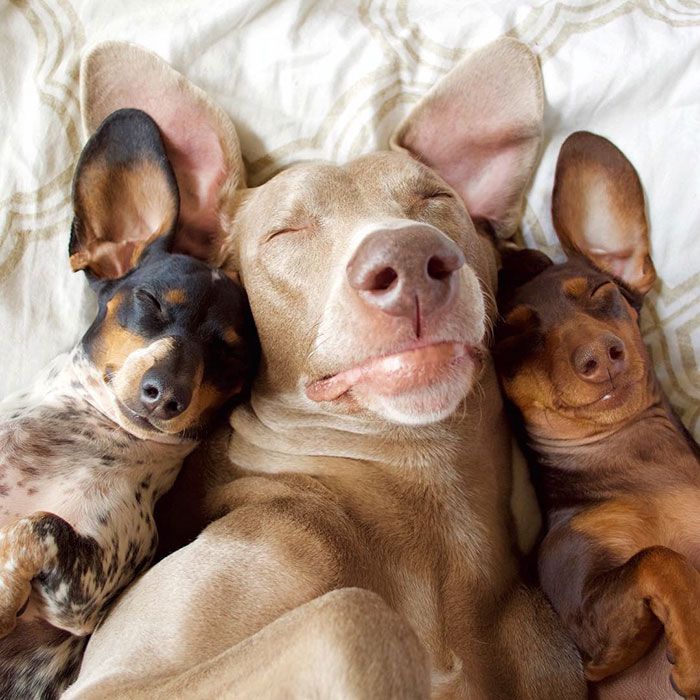
How common is it to sleep with your pet?
Over 60% of American households have pets, based on the latest numbers from the CDC. Of these, roughly half share their bedroom with their pet.
Where do our pets sleep? An American Kennel Club survey reports that 45% of dog owners let their dog sleep in their bed, while 20% crate their dog, and 17% use a dog bed.
However, perhaps fittingly, cats get to enjoy the lion’s share of the bedroom: Less than half of dogs (45%) get to share the bed, while 62% of cats sleep with their adult pet owners, and 13% of cats sleep with children, according to the National Pet Owners Survey by the American Pet Products Association.
Americans in particular love sleeping with their pets. In 2015, the online home design platform Houzz surveyed 10,000 pet owners around the world in 11 countries to track pet co-sleeping trends. Americans reported pet co-sleeping arrangements more than any other country, with 53% of American pet owners sleeping with their cats (compared to 30% in France and Germany at the other end of the spectrum), and 41% of American dog owners sharing the bed (compared to only 14% in Spain). 
Health benefits of sleeping with your pet
In 2014, Queensland University analyzed Sealy data of over 10,000 survey participants to analyze human-animal co-sleeping and its impact on sleep. Researchers found that people who shared a bed with their pets took longer to fall asleep (but only by 4 minutes) and were more likely to wake up tired, although the tiredness did not last throughout the day. While more research needs to be done, these are pretty minor sleep quality issues, especially when compared with the positive benefits many individuals report. 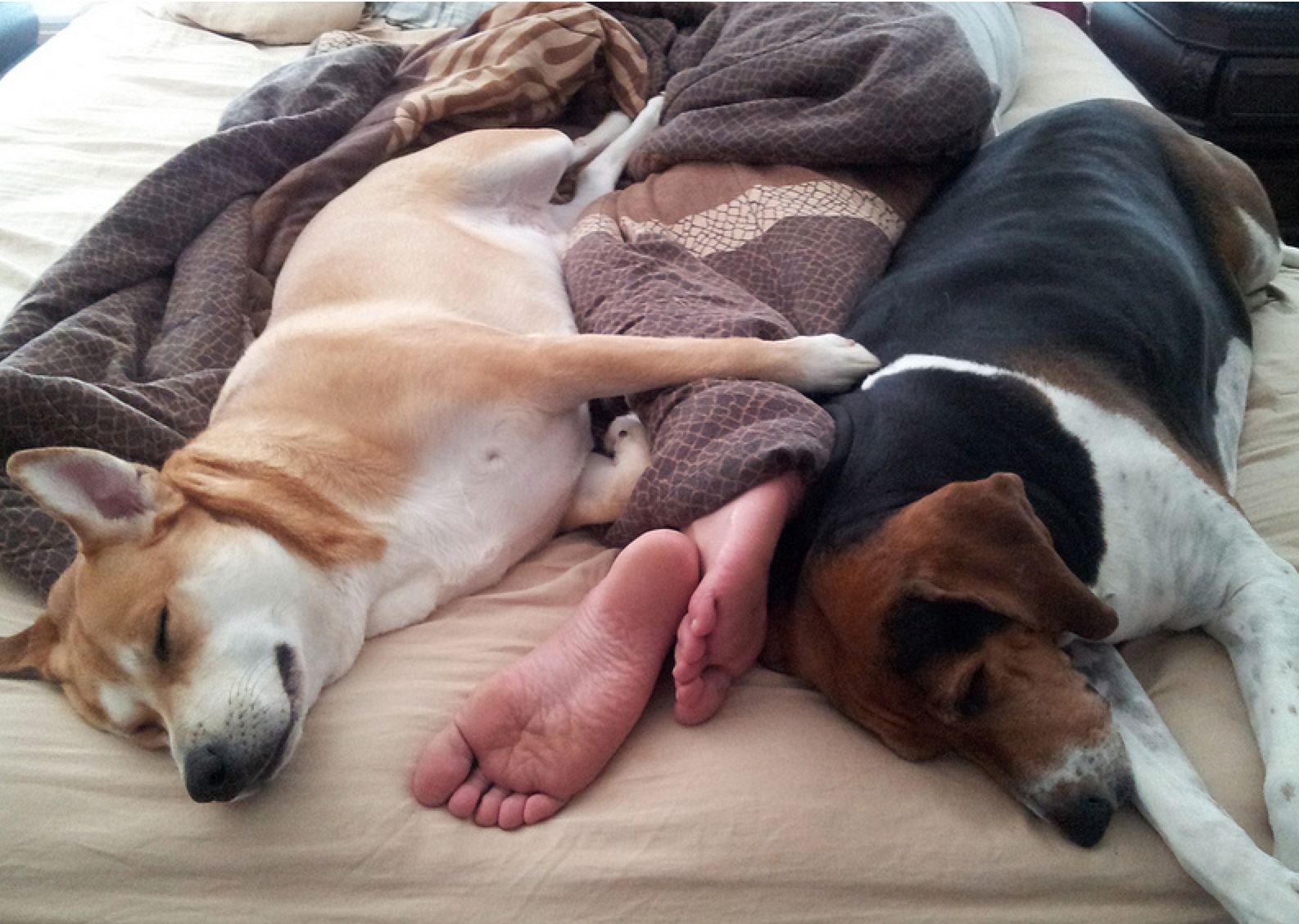
1. Greater sense of security
Sharing a bed with your pet can make you feel safer at night, both emotionally and physically.
Many people cite safety and protection as a reason for getting a dog – keeping your dog close to you while you’re at your most vulnerable (asleep) can fulfill this need. Some people simply feel safer sleeping with someone else in the bed – a pet can provide a good substitute for someone living alone or when their partner is away. 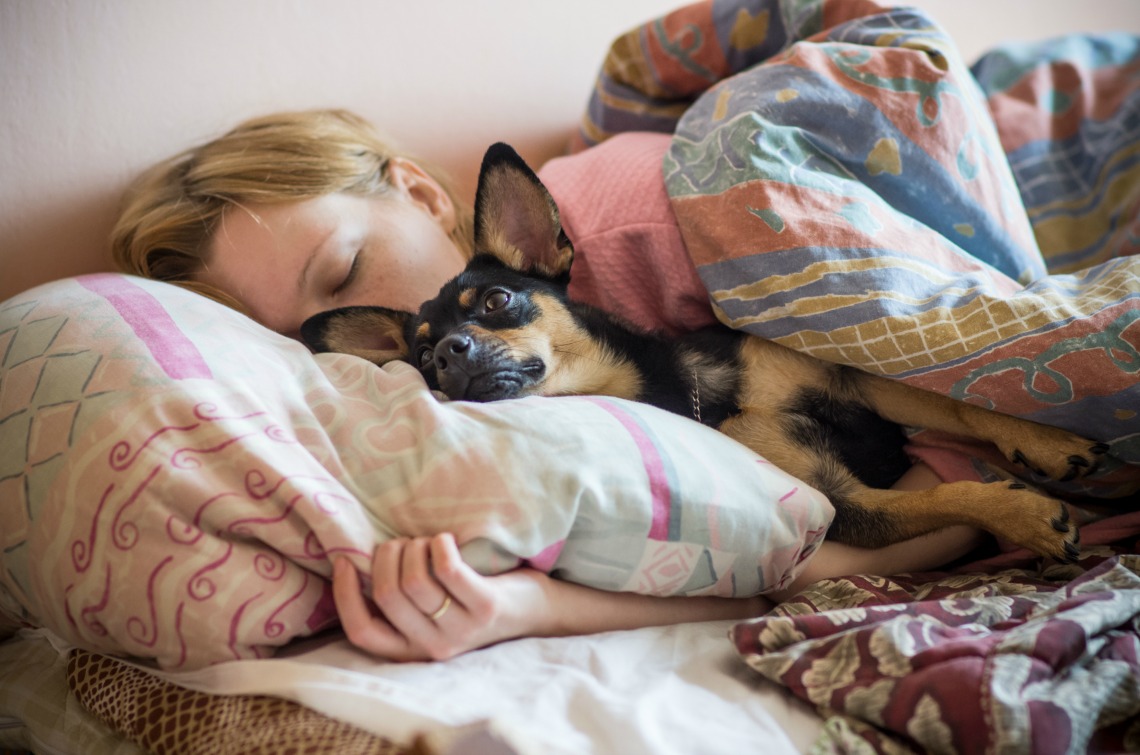
2. Reduced stress
Many people who suffer from insomnia also experience stress, depression and anxiety. The emotional turmoil of these disorders make it difficult to fall asleep at night.
Pets promote feelings of calm and relief, helping to counteract anxious thoughts associated with sleep-onset insomnia. Just touching them raises the level of oxytocin in our brains and makes us feel good. They are a reassuring presence that helps reduce stress. 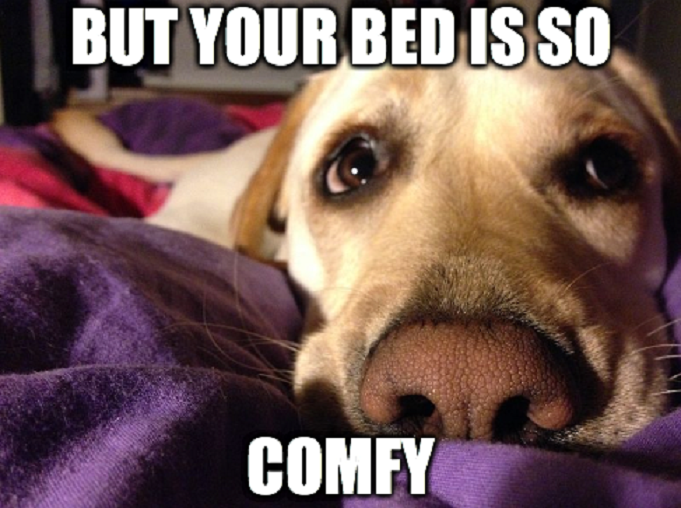
3. Warmth and comfort
The warmth and rhythmic breathing of a pet’s body in the bed can also provide a soothing effect that lulls a person to sleep. Pets have a warmer body temperature than us, and can act like a much safer version of an electric blanket.
However, a cool room temperature in the mid-60 degrees Fahrenheit is ideal for quality sleep, so you may want to set the thermostat a few degrees cooler if you allow your pet to sleep by you in the bed. 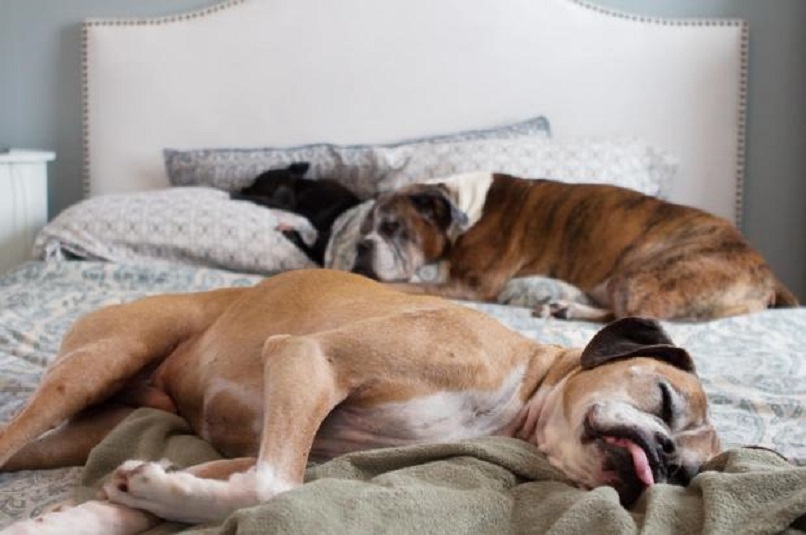
4. Better emotional bond
Your pet likes to be near you, so sleeping together makes them happy, too. Just like sleeping with a human partner can increase intimacy, so can sleeping with your pet.
If you work a typical schedule, your dog spends much of his or her day alone. Sleeping with you can help them feel more part of the pack. 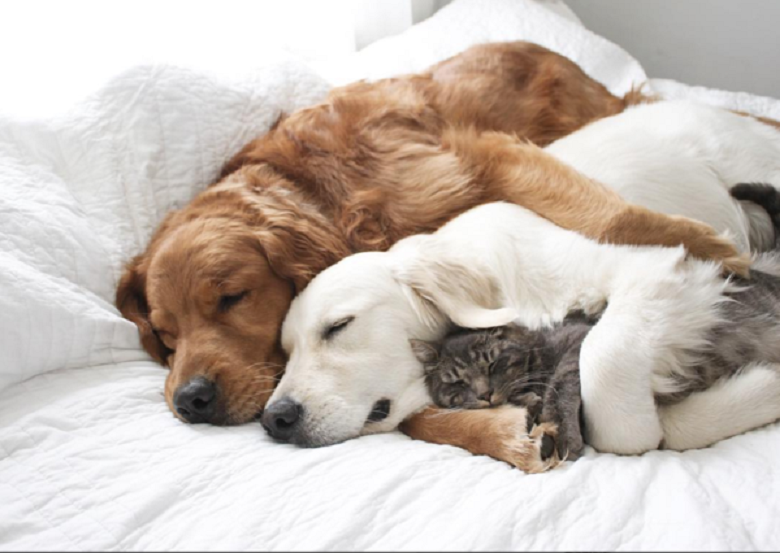
Health risks of sleeping with your pet
Sleeping with our pets is certainly popular, but is it good for us? According to a small 2014 study by the Mayo Clinic’s Center for Sleep Medicine of 150 patients, 41% said they had no effect or even a positive effect on their sleep, but 20% did say their pets disturbed their sleep, at least sometimes.
Let’s take a closer look at what could be causing that disrupted sleep. 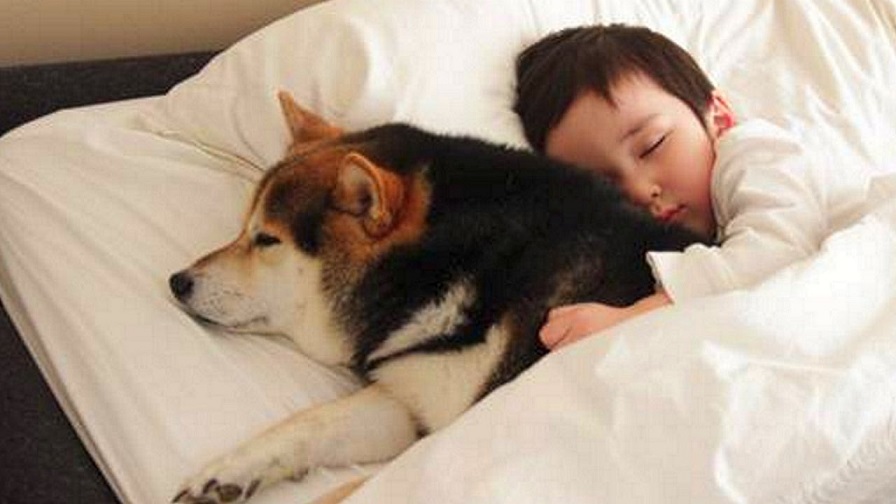
1. Aggravates pet allergies and asthma
Just under 10% of people suffer from asthma. According to the Asthma and Allergy Foundation of America, nearly one-third of people have allergies to dogs and cats.
If you’re in either of these demographics, you should not let your pet sleep in the same bed with you. In fact, they shouldn’t even be allowed in the bedroom, or you’ll have difficulty sleeping. The problem with pet allergens is that they aren’t isolated to your dog or cat’s body. Pet allergens can adhere to other surfaces (like clothing, bed frames, and bedding) and remain inflammatory to allergic individuals even when the pet has left the room.
If you’re allergic but want your pet to sleep in your room, always use a HEPA filter. Allergy shots can also help you build up a tolerance. 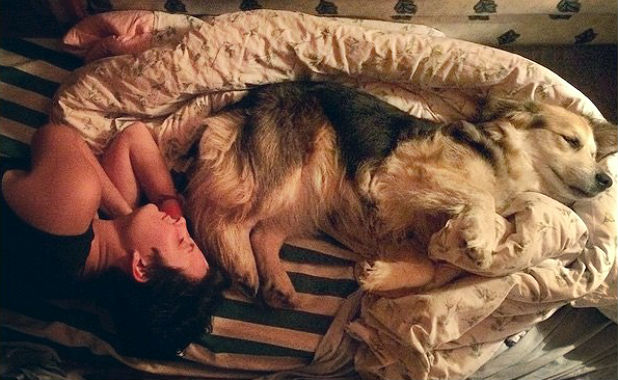
2. Increases risk of disease
Even if you’re not allergic to your pet, your pet spends more time outside interacting with things you take care to avoid, which could otherwise interfere with your health. In fact, the CDC estimates 60% of human pathogens are transmitted by animals.
Pets aren’t exactly clean, but if you keep your pet up to date on vaccinations and flea medication and they’re otherwise healthy, you should be fine to sleep with your pet.
However, the CDC does warn that sharing a bed with your pet can be as dangerous as face licking or kissing for transmission of zoonotic diseases, including plague, meningitis, and parasites. Of course, this is very rare, but if you’ve been bitten by fleas or have broken skin, and your dogs are infested, your risk is higher, and the risk is also increased for children.
Cat scratch disease is also caused by fleas. Contracted by about 20,000 people each year, it causes severe kidney, damage, and liver and spleen damage that can result in death. 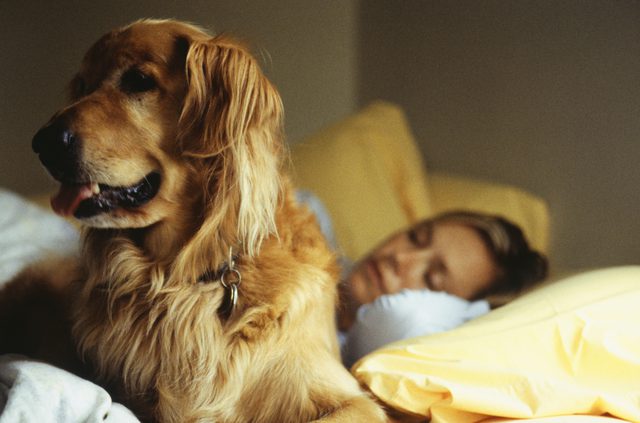
3. Interrupts sleep
Even if you don’t consider yourself a light sleeper, pets can disturb your sleep at night. Movement from smaller dogs or cats may not wake you, but a larger dog’s movement can wake you, especially on a mattress with poor motion isolation (a common issue with innerspring mattresses and waterbeds). Dogs have dreams just like we do, and kick, grunt and move in their sleep during REM sleep.
When pets scratch at night, the noise from their nails or jingling collar can also wake you up.
Because they’re nocturnal, cats are more likely to rouse sleepers during the night, happy to paw or sit on your face to get you to wake up and tend to them. Meanwhile, dogs of all sizes are comfortably inclined to try and hog the bed.
If your pet disturbs your sleep, one possible workaround is getting them their own bed or keeping them crated in the bedroom. That way they’re still nearby, but less likely to physically interrupt your sleep. 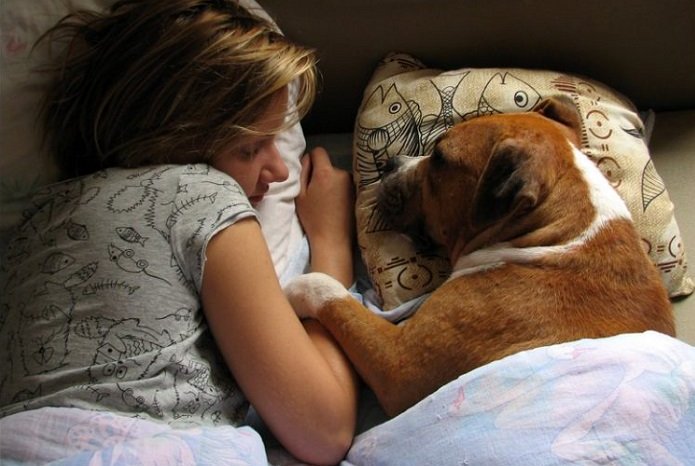
4. Causes dominance and aggression
Speaking of hogging the bed, allowing your pets to sleep in your bed can create or intensify dominance and aggression issues in both dogs and cats. From your pet’s point of view, you are granting them more territory on a physically higher space.
To counter these effects, choose a specific place on the bed where your dog is allowed to sleep, and only permit them on the bed if they stay in that place. 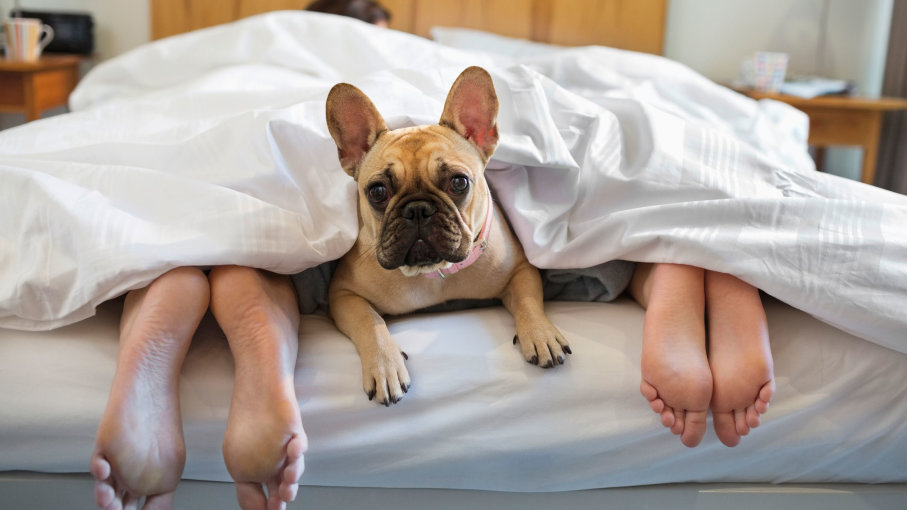
5. Interferes with intimacy for couples
Letting your pet sleep in the bed can prove problematic for couples. Physical touch and proximity is important for maintaining intimacy and connection as a couple.
Experts recommend not letting the dog sleep between the couple. Not only does it increase distance between the couples, it can also cause behavior issues for the dog, allowing them to feel more dominant in getting to sleep wherever they want and separate the humans. For both the relationship between you and your partner, as well as you and your dog, it’s better to have your dog sleep at the bottom of the bed or on the side of one person. 
Who shouldn’t sleep with their pets?
While the risks above are pretty minor, there are some people who should avoid sleeping with their pets.
People who are sick, have a condition that compromises their immune system, or are extremely asthmatic or allergic to pets: People with weaker immune systems are at greater risk of getting sick from pet-borne germs, illness, or other pathogens. When you’re sick, pets will try to “help” you when you have a sinus infection by licking your snot and spreading it over your face.
Infants: Not only are they more at risk from the germs pets carry, but your pet could put your child at risk of SIDS. Soft surfaces pose a smothering risk to your infant, and your pet may roll on top of the baby and block their airways.
Young children: Some dogs may bite by mistake when roused from sleep, especially if they’ve been having a nightmare, so it’s not advised to let them sleep in the same bed as a small child. 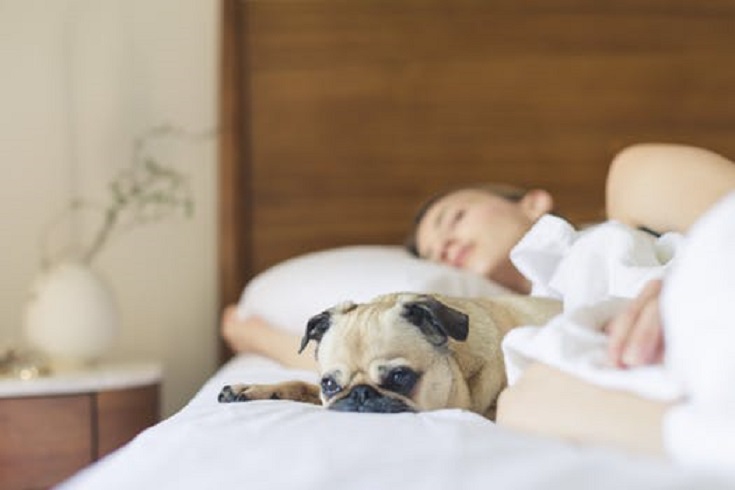
Tips for sleeping with your pet
1. Decide where you want to allow your pet to sleep when you first bring them home, and stay consistent from then on. Otherwise, you’ll have a much tougher time of removing perceived territory later (see tips for Dogs and Cats below).
2. Invest in a mattress large enough for all sleeping humans and animals that offers superior edge support and good motion isolation, like a memory foam or latex mattress.
3. If your pet wakes you during the night, do not indulge them with a midnight play or snack session. Give your pet adequate playtime and exercise during the day.
4. Create a schedule for your pet that designates daytime for play, exercise, and meals, and night for sleeping, and sleeping only. This helps establish a routine.
These are some general best practices you should follow when sleeping with your pet. Below are additional species-specific tips, depending on the type of pet you have. 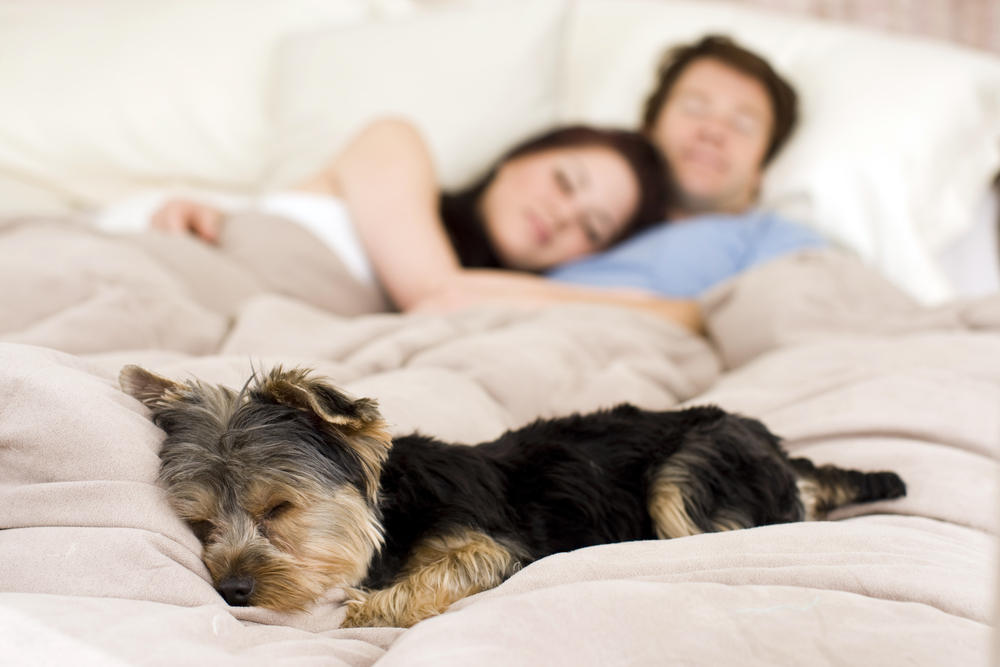
Sleeping with dogs
To avoid your dog waking you up to use the restroom during the night, be sure to them out one last time close to bedtime.
Some dogs may develop dominance or aggression issues if you give them full reign of the bed. To prevent this from happening, encourage your dog to sleep in a designated spot on the bed or in a dog bed or crate. 
Use positive reinforcement and lots of treats and affection whenever he lies down in the right spot or goes to his bed.
If your dog continues to try and claim other areas of the bed, physically block them with pillows, yourself, or something else.
Command your dog to move, when he goes to another spot on the bed, or get off, if he’s getting on the bed when you don’t want him to sleep on it.
Be consistent and stick with it. It may take a few weeks, but your dog will learn with time to wait for your command to join you on the bed, or to stay off it completely. 
Is snoring normal for dogs?
Dogs snore for the same reasons humans do – a blockage of the airways during sleep. Sometimes this is harmless, such as when your dog is sleeping on their back. Other times, it’s normal and dependent on their physical makeup, such as with brachycephalic breeds like pugs and bulldogs that have shorter snouts.
However, if your dog is overweight, extra fat may be collapsing their throat, similar to sleep apnea in humans. In this instance, you should work with your vet to develop a diet and exercise program. 
How much sleep do pets need?
Have you ever wondered how much sleep your pet needs? Different animals require differing amounts of sleep, depending on their species, predator or prey status, size, health, and environment.
Dogs sleep 12 to 14 hours per day, depending on their breed, size, age, and health. Larger dogs sleep more than smaller breeds, and puppies may sleep up to 20 hours per day to support their development (much like humans).
Dogs also experience a sleep cycle just like humans, beginning with slow wave light sleep and ending with REM sleep. However, they enter REM sleep much sooner (about 10 minutes after first falling asleep compared to 90 minutes in humans), and they spend only 10 percent of their total sleep time in REM, since their sleep is often interrupted by activity or noise. Humans, on the other hand, spend about 25 percent of their sleep in REM and require about 7 to 7.5 hours of sleep on average per night.
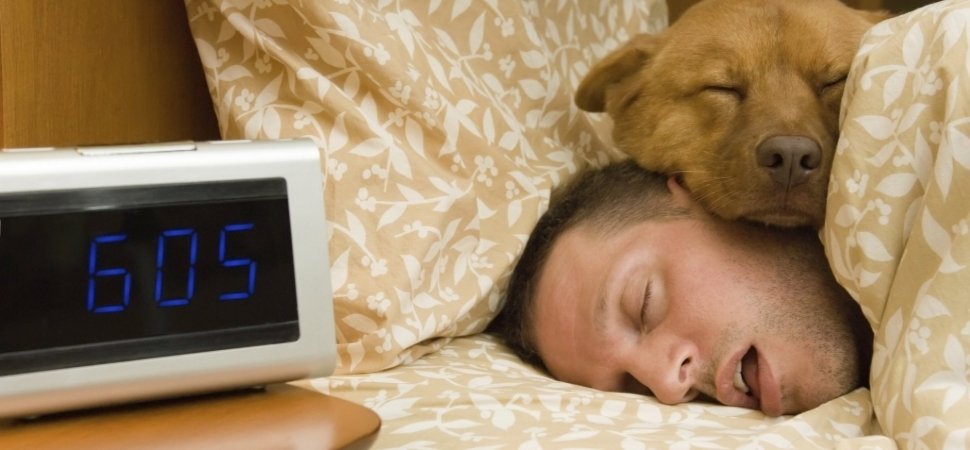
SOURCES
[1] "Tuck - Advancing Better Sleep "
[2] "Dog Conspiracy"






















